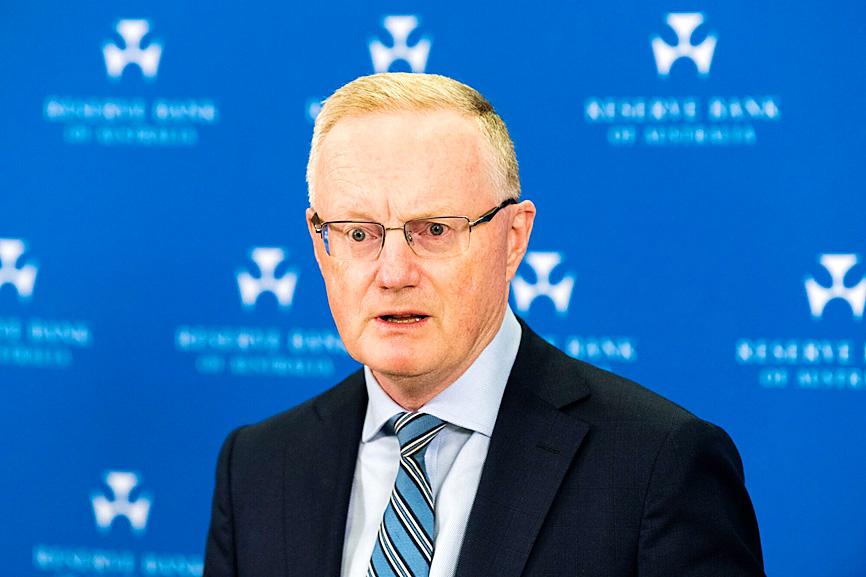Reserve Bank of Australia (RBA) Governor Philip Lowe pushed back against criticism of the central bank’s rate-setting board by an external panel and reiterated that he is willing to remain at the helm if offered an extension of his term.
An independent review of the bank released yesterday recommended creating a new monetary policy board to help align it with international counterparts.
The report found the current structure provides only “limited challenge” to the views of senior RBA officials.

Photo: Bloomberg
Lowe welcomed all 51 recommendations, while saying that the review’s “description of how the board process works and the challenge in the boardroom that the panel has doesn’t particularly resonate with me.”
All nine members are “deeply engaged” in decisionmaking and bring a “great deal of expertise to the issues,” Lowe said, adding that the members “are probing, they challenge me and sometimes I speak last in the meetings.”
The board’s composition has drawn criticism as it includes only one economist among six independent directors who are mainly drawn from business — leaving them ill-equipped to oppose the bank’s views.
Lowe, RBA Deputy Governor Michele Bullock and Australian Secretary of the Treasury Steven Kennedy round out the nine members.
“The idea that the board members sit there meekly and accept the recommendations that I put to them is very far from the reality that I have lived as the governor,” Lowe said.
However, the governor praised the review and pledged to work constructively with Australian Treasurer Jim Chalmers to implement the proposed changes.
Asked if he was hopeful of an extension after his current seven-year term ends in September, Lowe reiterated that he was willing to keep serving.
“If the government would like me to stay, I’m happy to stay,” he said. “But if they want to have someone else for the reasons you’re articulating, I’d perfectly understand that and have other things to do with my life.”
Chalmers earlier in the day restated his intentions to announce a decision on the governor in the middle of the year.

UNCERTAINTIES: Exports surged 34.1% and private investment grew 7.03% to outpace expectations in the first half, although US tariffs could stall momentum The Chung-Hua Institution for Economic Research (CIER, 中華經濟研究院) yesterday raised its GDP growth forecast to 3.05 percent this year on a robust first-half performance, but warned that US tariff threats and external uncertainty could stall momentum in the second half of the year. “The first half proved exceptionally strong, allowing room for optimism,” CIER president Lien Hsien-ming (連賢明) said. “But the growth momentum may slow moving forward due to US tariffs.” The tariff threat poses definite downside risks, although the scale of the impact remains unclear given the unpredictability of US President Donald Trump’s policies, Lien said. Despite the headwinds, Taiwan is likely

When Lika Megreladze was a child, life in her native western Georgian region of Guria revolved around tea. Her mother worked for decades as a scientist at the Soviet Union’s Institute of Tea and Subtropical Crops in the village of Anaseuli, Georgia, perfecting cultivation methods for a Georgian tea industry that supplied the bulk of the vast communist state’s brews. “When I was a child, this was only my mum’s workplace. Only later I realized that it was something big,” she said. Now, the institute lies abandoned. Yellowed papers are strewn around its decaying corridors, and a statue of Soviet founder Vladimir Lenin

UNIFYING OPPOSITION: Numerous companies have registered complaints over the potential levies, bringing together rival automakers in voicing their reservations US President Donald Trump is readying plans for industry-specific tariffs to kick in alongside his country-by-country duties in two weeks, ramping up his push to reshape the US’ standing in the global trading system by penalizing purchases from abroad. Administration officials could release details of Trump’s planned 50 percent duty on copper in the days before they are set to take effect on Friday next week, a person familiar with the matter said. That is the same date Trump’s “reciprocal” levies on products from more than 100 nations are slated to begin. Trump on Tuesday said that he is likely to impose tariffs

READY TO BUY: Shortly after Nvidia announced the approval, Chinese firms scrambled to order the H20 GPUs, which the company must send to the US government for approval Nvidia Corp chief executive officer Jensen Huang (黃仁勳) late on Monday said the technology giant has won approval from US President Donald Trump’s administration to sell its advanced H20 graphics processing units (GPUs) used to develop artificial intelligence (AI) to China. The news came in a company blog post late on Monday and Huang also spoke about the coup on China’s state-run China Global Television Network in remarks shown on X. “The US government has assured Nvidia that licenses will be granted, and Nvidia hopes to start deliveries soon,” the post said. “Today, I’m announcing that the US government has approved for us